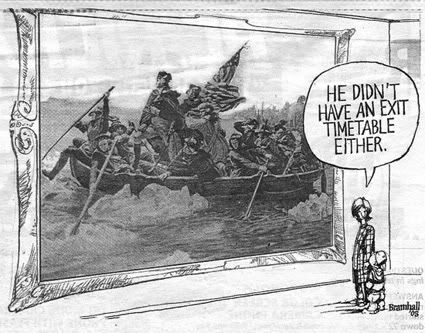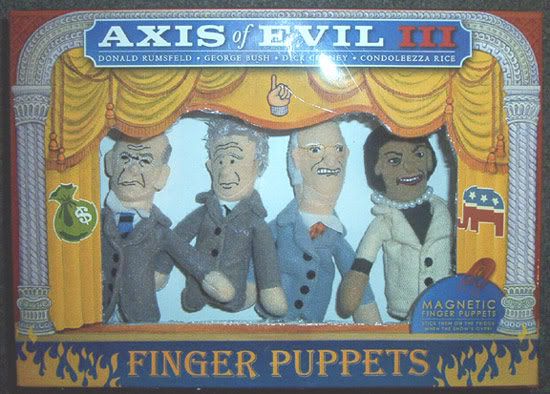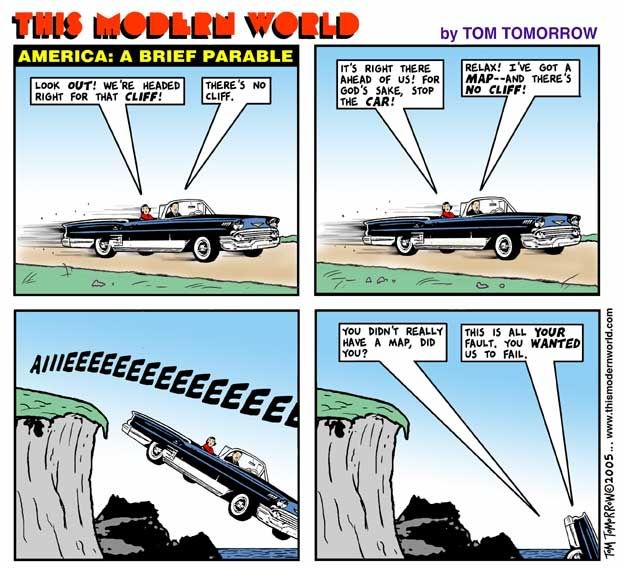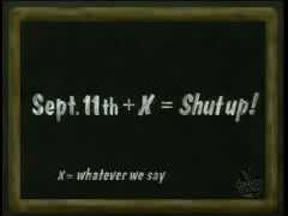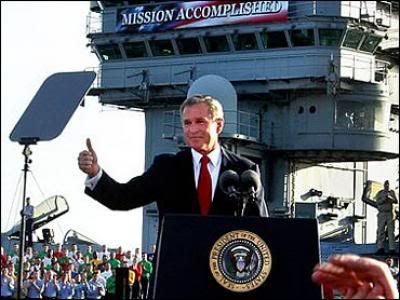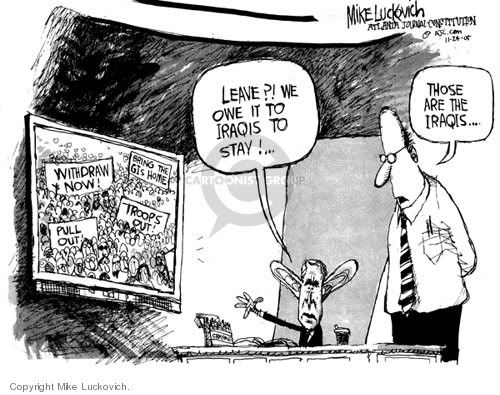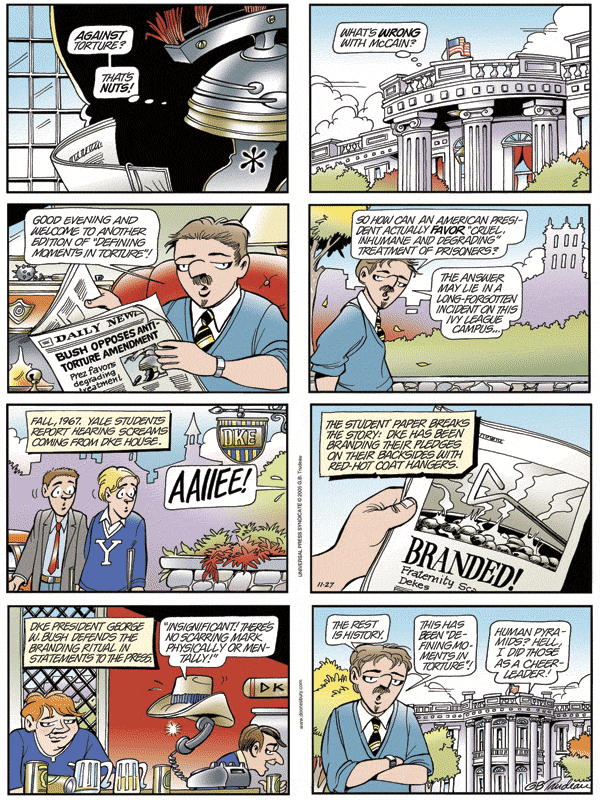[Warning: Long entry ahead]
Obviously, I write about Iraq on a daily basis. I was never a supporter of this war, but the reality has far exceeded my worst fears. It's one bit of bad news after the other and all we get from the White House are talking points and questionable assurances that all is a-okay.
Still, sometimes I wonder if I am overly negative? Or just being realistic?
Bush supporters (what's left of them, anyway) constantly complain that all the media does is write about the deaths in Iraq and the bad things there and criticize Bush. They state that the media should write about the good things happening in Iraq. Is this a fair point? And, more importantly, are there actually good things happening there other than talking points created in PR releases?
I'm curious how people feel about this.
I posed that question- is the media failing to report on the good news in Iraq? - to a number of my friends over the past week. The answer I got back from all of them was basically "If good things happened in Iraq, they'll report them. We're just waiting for that to happen".
Here's my thoughts- For one, I have never bought the liberal media bias charges, specifically in regards to this war. If there is any bias in media, it is for ratings and profit. The Plamegate mess has exposed just how BS the bias charge is. They want access and they want big stories. The NY Times, thanks to Ms. 'Run Amok' Judy Miller, helped the administration sell their war (but no, it must be anti-Bush because Maureen Dowd, a columnist, don't like him). Bob Woodward sold out too. Tim Russert still can't figure out how to ask anything other than softball questions on 'Meet The Press'; he's in this mess too deep. Most of the media was
asleep at the wheel before the war, happily cheerleading for the war because it made people feel good to wave the flag. That they have now begun focusing on the
reality of the war is just them playing catch-up.
Regarding the idea that all the media does is discuss the bad news in Iraq, well I think that's the reality. Could the media maybe report more on positive things? Of course. But is that the real story? The place is a hellhole and all reports indicate is not only not better than under Saddam, in some areas it has only gotten worse (mass graves are out;
roadside bombs are in). We're just treading water over there. People are dying, the infrastructure is destroyed, and you can't tell enemy from friend. As for good things happening there- I have to question this.
Good news that comes out of Iraq are things like parliamentary elections or a school being reopened somewhere. But even these 'good news' stories are shadowed by the harsh realities of life in Baghdad. Elections are inspiring, yes, but how much progress can be made if by going to vote you are risking your life? "90% of the people who voted today were not attacked! Go democracy!". And when a school reopens, how long before it is blown up or attacked? Can the children truly get an education when they and the teachers must constantly be on guard? I don't wish to downplay these things, and I give the Iraqis great respect for dealing with this, but in the end aren't these just symbolic victories?
Lord knows this administration loves staged, symbolic victories (The
Mission Accomplished photo-op,
Jessica Lynch, and the
Saddam statue incident in Iraq;
Pat Tillman in Afghanistan). Real victories... they're not so good at. The Iraqis are on a day-to-day survival lifestyle and that's no way to live. We certainly wouldn't celebrate if life
in America were like this.
Almost all the genuinely good news I hear or
read (such as the securing of the road from Baghdad International Airport to the Green Zone) are victories of the Iraqi forces. Victories that our presence there hindered (and were only necessary to begin with because we bungled the initial invasion). Progress was/is achieved when U.S. forces step back and let the Iraqis come to the forefront.
Finally, is good news in a warzone really good news if it has no effect on how bad of a warzone it is? A decrease in violence would constitute good news. A small section of a small town getting electricity back for a few hours a day? Not so much.
And the blame for this I believe fairly lies with the Bush administration and the incompetent way they waged this war. They failed to plan for a post-invasion occupation... Heck, they failed to plan for the possibility that a) the war might last more than a week or two, and b) the Iraqis might actually fight back. Think about it. And it was just announced that tomorrow the President
will unveil the White House's "National Strategy for Victory in Iraq". Strategy for victory? Shouldn't they have come up with that
before the war?
In addition, despite whatever
the President says about withdrawal being a "mistake", I have no doubt that they will withdraw next year. All this yelling at the Democrats for wanting to 'cut and run' is a political ploy. We all know we'll be pulling out at least some troops by next year. President Bush and the Republicans just don't want the Democrats to get the credit for bringing our boys home. And so the Murthas of Congress are labeled 'cowards'. But make no mistake about, this war is
over. The administration is just waiting for the politically opportune time to end it officially. On their terms. When it works best for them. Not for the troops. And not for the Iraqis.
The big reason given against withdrawal is that it would leave Iraq in a state of disaster. Not sure what they believe will happen. That terrorists will flow in and begin killing people? No, that happened already. That the country will descend into violence? Happened already. That the various factions will start fighting amongst each other? Happening already. And much of this is intensified by our presence there, as John Murtha has noted (and I'll take the word of war heroes like him and Chuck Hagel over people like Bush, Cheney, and Rumsfeld who've never seen military action). Leaving will always be messy. But it needs to be done. The Iraqis have asked us to go. Any further delay now by the President only proves his real concern is the political fallout.
And not only have they left Iraq a disaster, they have destroyed the credibility of the Executive branch with the Congress and the public for a generation. I would like to see them impeached, but that all depends on if the Democrats can regain control of Congress next year. And despite the polls, that's definitely still a stretch.
We are also seeing things in this war that the United States has never seen before in its history- officially sanctioned torture, the use of chemical weapons in civilian areas, and other acts that we would consider criminal of our enemies. Is this not doing more damage than good? How long will it take for our image around the world to recover from this?
And I suppose, for me, that is the biggest mess of this... not what this war has done to Iraq (which, yes, can become a great success in 10 years or so once the Iraqis take control of their destiny), but what it has done to our own country. It will be a long time before this country gets over this war and heals the divisions that our "uniter, not divider" President has caused. It is 2005 and we are still not over Vietnam. The 2004 election, and its revisiting of Vietnam vis-a-vis Iraq, made that clear. We are still not over the 'long national nightmare' of the Nixon scandals. The fact that every scandal has "-gate" tagged onto it makes that clear. The peaceful and prosperous Clinton years made progress toward moving forward optimistically to the next millenium. The Bush administration has damaged all of that. They have given us a new war, and new and greater political scandals/crimes, to haunt us for another 30 years. Whoever the next President is, either Republican or Democrat, much of their term will be devoted to undoing the political damage (not just here, but mainly abroad) of this administration.
The only people who continue to defend this President and his war (and it will always
his war, not that of the United States) are the now-minority who want to believe in President Bush's leadership. But as poor of a leader he is in general, and he is an even worse Commander-In-Chief. He is the only Commander-In-Chief to never attend a
single funeral of a fallen soldier (is he afraid that the families of the fallen might have tough questions for him?). He is the only Commander-In-Chief to cut taxes during wartime. And, though he likes to ridiculously compare this conflict to WWII, he has not taken FDR's lead and asked the country to make sacrifices for the war. Not that Americans want to make any.
President Bush is not a good leader. Supporting him blindly is not patriotism. Part of being a good leader, and a patriot, is admitting to mistakes and working to correct them. But President Bush is incapable of that. He does not look at the facts and seek to correct his actions in response to them. He looks at his actions and demands that the facts correct themselves instead. That is the type of poor leadership that
rushed us into the war and has prolonged it since then.
Over 2,100 U.S. soldiers
are dead. Hundreds of troops from coalition ranks have died as well. Around 30,000 Iraqi civilians are dead. What did they die for? The answer changes on a weekly basis. I imagine we'll get the latest version of the rationale tomorrow. Will it make any difference? NO. Was this worth it, no matter how Iraq turns out? No. The damage has already been done. And people continue to die. And it won't end until the President makes the tough decision and begins withdrawing troops, so that the Iraqis can truly move forward. Or, to him, so he can move forward with his unwanted domestic agenda. And we can go back to fighting the real war on terror. Somewhere, Osama bin Laden is
hiding. Let's go find him. If the President knows how.
Just my three cents. I do hope for the best, I really do, I just won't be holding my breath.

